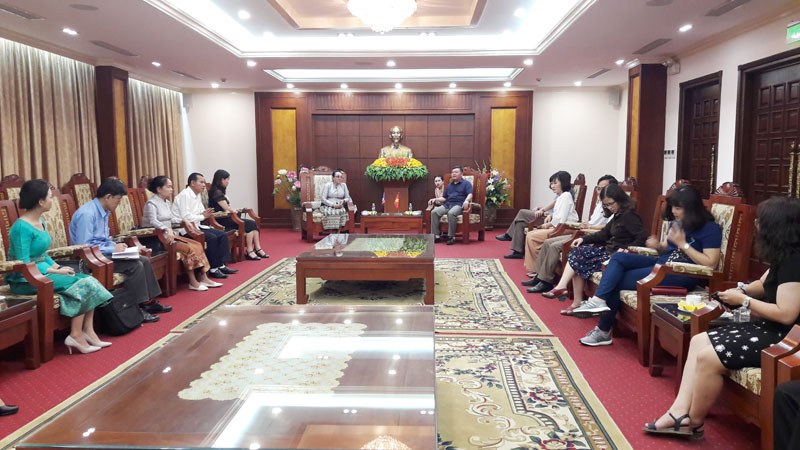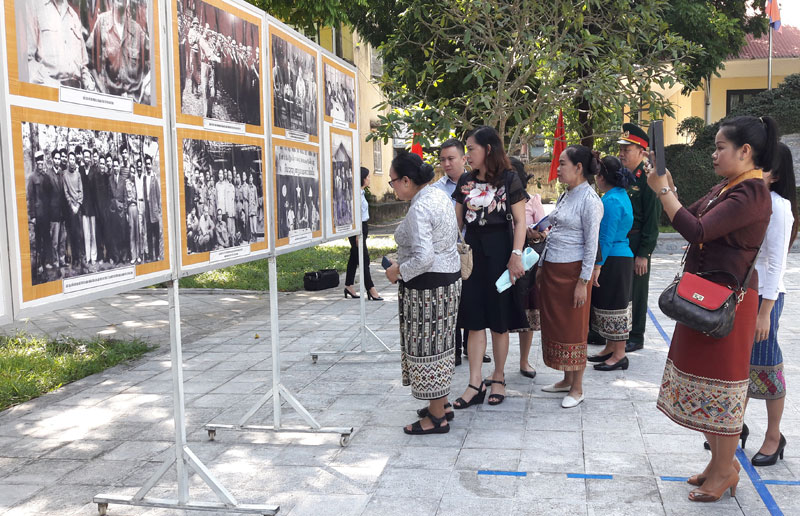
(HBO) – A delegation from the Archives Department of the Office of the Lao People’s Revolutionary Party (LPRP) Central Committee led by its head Nangsiengkham Phommavongsa paid a working visit to Hoa Binh province on October 15. The Lao guests were received by Nguyen Dong, member of the provincial Party Committee and Chief of the committee’s Office, leaders and experts from the office, and representatives from the provincial Military High Command.
Leaders of the Office of the
provincial Party Committee receive and hold working session with the Lao
delegation.
The delegation from the Archives Department of
the Office of the LPRP Central Committee visits the National Historical Relic
Site, where the second Congress of the Lao People’s Party took place.
At the working session, Nguyen Dong, member of
the provincial Party Committee and Chief of the committee’s Office, briefed his
guests on the province’s socio-economic development situation in the first nine
months of this year as well as archives activities of the provincial Party
Committee over the past time. He highlighted the profound friendship and close
relationship between Vietnam and Laos over the past years.
Nangsiengkham Phommavongsa, head of the Archives
Department of the Office of the LPRP Central Committee, expressed his pleasure
to visit Hoa Binh province. He spoke highly of the development and great
achievements the province has recorded in the past years. He wished that the
fine relationship between Laos and Vietnam in general and Hoa Binh in
particular will be further consolidated.
On the same day, the Lao delegation visited the
National Historical Relic Site, where the second Congress of the Lao People’s
Party took place in the campus of the provincial Military High Command and
noted his feelings in the site’s traditional golden book. Over the past years,
the relic site has contributed to popularizing and educating the two countries’
young generations about the revolutionary tradition and the Vietnam-Laos
special friendship in the struggle for national liberation and socialism
building, thus fostering the bonds between the two countries’ Parties, States
and people.
Within the framework of the working trip, the delegation
visited the Kim Boi Hot Spring and the nursing centre for people who rendered
service to the nation in Kim Boi district./.
The Standing Board of the Hoa Binh provincial Party Committee has agreed in principle on a proposal by the Standing Board of the Party Committee of Hoa Binh city to gather feedback on the city’s 1:2000 zoning plan, which forms part of its broader urban development strategy.
Hoa Binh province has made notable progress in public administration reform and digital government development, with the satisfaction index among citizens and businesses reaching over 84%, according to recent government evaluations.
Thanks to great efforts by local authorities in recent times, the governance and public administration performance of Mai Chau district has been significantly improved.
In the afternoon of June 6, the Party Committee, the People's Council, the People's Committee and the Fatherland Front of Lac Son district solemnly held a meeting to celebrate the 139th anniversary of the district's founding (1886–2025) and the 79th anniversary of the establishment of the district's Party Committee (1946–2025). There was the attendance of Mr. Bui Van Thang, the Vice Chairman of the Provincial People's Council; Mr. Quach Tat Liem, the Vice Chairman of the Provincial People's Committee; Ms. Dang Bich Ngoc, the Deputy Head of the National Assembly Delegation of the province; as well as the former leaders of the province and district through various periods, who are the natives of the district.
Implementing the Politburo’s Resolution No. 57-NQ/TW on breakthroughs in science – technology, innovation, and digital transformation is a golden opportunity for the northern mountainous province of Hoa Binh to renew growth model, improve competitive edge and shorten digital gap.
Resolution 57-NQ/TW, issued by the Politburo on December 22, 2024, identifies sci-tech, innovation, and digital transformation as strategic breakthroughs to build a developed and prosperous nation. In Hoa Binh province, this spirit is not just a slogan, it’s being put into action through concrete initiatives that form a "new development triangle”: digital citizenship, digital economy, and digital administration.




